The Australian Women’s National Team
While records of women's football in Australia date back to the 1920's, the historic first Australian women's team was established in 1978 to take part in the first World Women's Invitational Tournament in Chinese Taipei. Australia was the only national team in the tournament with the other 12 countries represented by club or district teams.
Australia's squad for the 1978 tournament, selected by first Australian women's team coach Jim Selby, consisted of players mainly from NSW and Western Australia. Captain Connie Byrnes had the honour of captaining the first Australian senior national women’s team.
In the first round of matches Australia was missed sixth place only on goal difference. The Australians then competed in the second round for teams placed seventh to thirteenth, ultimately finishing eighth in the tournament.
Australia's results of the 1978 World Women's Invitational Tournament in Chinese Taipei: W1-0 v Austria, D1-1 v USA, L0-1 v Sweden, D0-0 v Denmark and W5-0 v Thailand. Young Australian Anna Senjuschenko (who tragically died in a car accident in 1979 aged 17) was voted a star player of the tournament by the media, while Connie Byrnes was awarded ‘Miss Football’ for Australia.
The women’s team played on sporadic occasions throughout the 1980s, with only a limited number of major international competitions enticing much attention to the team.
The introduction of the FIFA Women’s World Cup and women’s football at the Olympic Games in the 1990s, combined with a surge in participation levels throughout the country, sparked renewed interest in the national women’s team, now called the Commonwealth Bank Matildas.
On 6 October 1979, the Matildas played New Zealand in their first full 'A' international at Seymour Shaw Park in Sydney, in a game that finished 2-2. Julie Dolan AM, who was the captain of the team for that game, was bestowed the honour of cap number one for the Matildas.
.jpg)
Julie Dolan's image from the first ever Matildas match in 1979 is projected onto the Sydney Opera House in 2020.
After barely being beaten out of a place at the inaugural FIFA Women’s World Cup in China in 1991 on goal difference (by New Zealand in the Oceania qualifiers), the Australian women’s national team has never failed to qualify for the World Cup, finishing as top team in Oceania in the 1995, 1999 and 2003 Oceania World Cup qualifiers.
The Matildas qualified for the 2007 finals via Asia for the first time, after reaching the final of the 2006 AFC Asian Women’s Championship in Adelaide. Australia qualified for the following year’s World Cup after defeating Japan in the semi-final 2-0 (top three nations in the tournament qualified for the World Cup); the final however saw the Matildas go down to China only after a penalty shoot-out, to finish runners-up in the tournament.
The Aussies went that one better in a memorable 2010 AFC Asian Women’s Cup in China, defeating the highly-fancied DPR Korea side on penalties in the final following a 1-1 scoreline after 120 minutes of play, and earning the country another shot at the World Cup.

The Matildas celebrate after winning Australia's first piece of silverware in Asia.
Australia appeared to gradually learn and improve throughout each of its first few World Cup forays, as the aggregate goal differences over each World Cup shows: a goals for-and-against record of 3-13 (minus 10) in its 1995 World Cup matches reduced to minus 4 in 1999, and went down to minus 2 in the 2003 campaign. By the 2007 tournament, a positive goal difference over the four matches, which included Australia’s first World Cup finals win (4-1 over Ghana) and quarter-final appearance (a 2-3 loss to Brazil) displayed how far the Aussie women’s team had come over the previous 12 years. Further testament to the team was provided when coach Tom Sermanni was named 2007 AFC Coach of the Year.
In 2011 Australia put in arguably their best FIFA Women’s World Cup performance to date with a strong showing in Group D where the team came out of the group with six points following wins against Equatorial Guinea and Norway as well as a narrow 1-nil loss to Brazil. In a tournament where Australia had the third youngest team, with an average age of 22, the team performed strongly and received many plaudits for their style of play and character. Australia were knocked out in the quarter final by eventual third-placed Sweden, losing 3-1 to the world’s fifth ranked nation.
2015 saw Australia start their FIFA Women's World Cup campaign against eventual winners the United States in their opening Group D clash. Playing some scintillating football, the Matildas pushed the Americans all the way before losing 3-1.
Next up was Nigeria, and a Kyah Simon double was enough to earn Australia a crucial 2-0 win, setting up a clash with Sweden, the side that had knocked them out four years earlier. Despite a 1-1 draw Australia finished second in their group and would face an imposing Brazil side in the Round of 16.
.jpg)
Kyah Simon and Lisa De Vanna celebrate the former's massive goal against Brazil in 2015.
That match in Moncton would go on to become part of Australian football folklore, as the Matildas shocked the more-fancied Brazilians. Another Kyah Simon goal, this time in the 80th minute, sealed a memorable result.
A quarter-final against eventual runners-up Japan would prove a bridge too far, with the Green and Gold going down 1-0 in Edmonton.
Drawn in Group C, the Matildas began their FIFA Women's World Cup 2019 against the fast-improving Italy. It was a bright start for Australia as captain Sam Kerr opened her FIFA Women's World Cup account with a penalty conversion in the first half. However, it wasn't enough for victory as the Italians recorded a late winner to take the three points.
A familiar opponent was next for Australia as, for the fifth major tournament in a row, they were to met Brazil. It was a match befitting the rivalry built between the two nations with the Matildas coming back from a 2-0 deficit to claim a famous 3-2 victory in Montpellier.
.jpg)
Celebrating another famous win over Brazil at the FIFA Women's World Cup.
A superstar prior to the tournament, Kerr made Australian history in the final group match against Jamaica. The prolific striker netted all of Australia's goals, becoming the first Aussie to score a FIFA World Cup hat-trick, in their 4-1 win over the Reggae Girlz to set up a Round of 16 clash with Norway.
After Norway took a first half lead in the Round of 16 encounter, Australia worked their way into the match and put pressure on the Norwegians. That pressure finally told in the second half with Elise Kellond-Knight scoring straight from a corner to bring the Matildas level. A back and forth struggle resulted in penalties with Australia ending their tournament in Nice.
Australia was swept with Matildas fever, and in late 2019 set a record for the highest attended standalone women's football match in the country's history. 20,029 fans turned out at Bankwest Stadium in Sydney on 9 November to support the Green & Gold in a friendly match against Chile.

20,029 fans turned out at Bankwest Stadium in Sydney on 9 November to support the Matildas in a friendly match against Chile.
In 2021, the Matildas were drawn against USA, Sweden & New Zealand in their group for the postponed Tokyo Olympic Games.
A win against New Zealand and draw with USA was enough for the team to get out of the group, before defeated Great Britain 4-3 after extra time in a thrilling Quarter Final.
The side was guaranteed a top-4 finish - the Matildas' best ever result at an Olympic Games - but narrow defeats to Sweden & USA in the Semi Finals & Bronze Medal matches respectively meant Australia just missed out on a first-ever football medal.
Off the back of their historic Tokyo 2020 tournament, the Matildas returned home to Australia in October 2021 for a two-match series against Brazil at CommBank Stadium, resulting in an Australia win in the first game and a 2-2 draw in the second.
But just a month later, the Matildas broke their home attendance record when a massive 35,109 fans turned out at Stadium Australia to see them face World Number One United States.

2023 will see the CommBank Matildas compete in a home FIFA Women’s World CupTM. Co-hosted with New Zealand, the tournament will be the first in the Southern Hemisphere, the first in the Asia-Pacific region, the first co-confederation FIFA tournament and the first time Australia will host a senior FIFA tournament.
